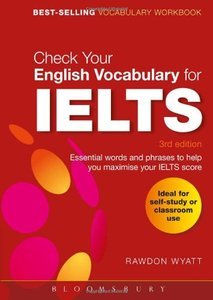This workbook has been written for students who are planning to sit either the Academic or General Training modules of the IELTS examination. It covers some of the main vocabulary areas that you will need for, or come across in, the Listening, Reading, Writing and Speaking sections of the exam. We hope that you find the exercises in this book useful, and that the vocabulary you acquire will help you to achieve the grade you want in the IELTS. Good luck! Structure of the book Each vocabulary area is presented in the form of a self-contained module with task-based activities which present each vocabulary item in context.
• Pages 1-57 focus on general vocabulary items. Some of these are relevant to specific tasks or questions in the IELTS examination (for example, describing how something works, talking about changes shown in a graph or table, saying where things are and following directions).
• Pages 58-104 focus on topic-specific vocabulary areas which may be required in the examination (for example, education, architecture, family matters and science and technology). Each module consists of three tasks: the first two present vocabulary items in context, each with a practice or recognition exercise, and the third gives you the opportunity to review the vocabulary in a gap-fill exercise.
• Pages 105-124 contain a comprehensive key so you can check your answers. The answer key also gives additional information about specific vocabulary items or general vocabulary areas, as well as other useful words or phrases.
Using the workbook
You should not work through the book mechanically from beginning to end. It is better to choose areas that you are unfamiliar with, or areas that you feel are of specific interest or importance to yourself. Recording, reviewing and extending your vocabulary Remember that you should keep a record of new words, phrases and expressions that you acquire, and review these on a regular basis so that they become part of your active vocabulary. Also remember that there are other ways of acquiring new vocabulary. For example, you should read as much as possible from a variety of authentic reading materials (books, newspapers, magazines, web-based articles, etc.). Using an English dictionary To help you develop your vocabulary more effectively, you should use a good monolingual English dictionary. This should clearly explain what the words mean, show you how they are pronounced, show you their various forms where relevant (e.g., what the noun form of an adjective is), tell you which words or phrases they collocate with, and give sample sentences to show you how the words are used. We particularly recommend the Macmillan English Dictionary for Advanced Learners. A free on-line version of this can also be found at http://www.macmillandictionary.com The International English Language Testing System (IELTS) The IELTS is administered by the University of Cambridge Local Examinations Syndicate (UCLES), the British Council and IDP Education Australia. For further information, visit http://www.ucles.org.uk. Note that this book is not endorsed by any of these organisations.

